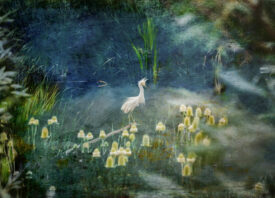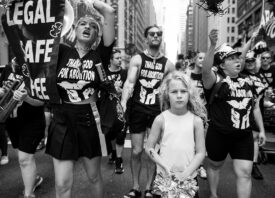Search this site
Mental Health Photography: Personal Stories from Photographers Coping with Depression

As she entered mid-life, Susan Borowitz had her first experience with clinical depression. “My particular trigger came in the form of small airplanes that flew near my house from the nearby airport,” she remembers. “Whenever I heard them, I would tense up, my anxiety would skyrocket, and I would go deeper into despair.” She also remembers laying down on the floor of the shower and letting the hot water run over her: it was one thing that helped her to feel calm.
Ultimately, Borowitz sought help through psychotherapy and medication. She emerged from that period of despair. Somewhere along the way, she discovered a passion for photography as well.
In the beginning, she was mostly experimenting and learning, but over time, she noticed a recurring motif throughout her photographs: “a woman feeling stuck, being stuck, unable to move forward.” Her mind turned back to that time when she was clinically depressed.
Through her work, perhaps Borowitz is coming to terms with what happened to her in the past. Maybe she’s fortifying herself in case it happens again in the future. Probably both. “I can’t say why I wanted to do it,” she tells me. “It just became what I do.”
This kind of internal drive and motivation—the idea photographers make pictures not necessarily because they want to but because they feel they must—comes up again and again when I speak to artists making work about their experiences with depression. Then, somewhere along the way, they inevitably end up helping other people by showing us that we’re not alone. I asked four photographers to share their stories.
Troy Colby: Coping with depression through mental health photography

Troy Colby was diagnosed with clinical depression at the age of eighteen. “I supposed it never really went away, but it just had shifted and taken other forms in my life,” he says now. “In 2019, it took hold so bad that I would cry at every word, and couldn’t function for the life of me.”
During periods of depression, like the one he experienced in 2019, making pictures has been impossible. “When I am truly depressed, I cannot make any work,” he says. “It is in the moments of clarity or calm when the work takes place. Then, I am able to look back and realize how internalized these feelings and emotions really were.”
These days, Colby maintains his mental health by going to counseling once a month. He still has difficult days—after all, “depression never leaves and there is no cure”—but he reminds himself to appreciate the good things as well. And throughout it all, photography has always been something he can return to.
“Honestly, without the camera, I may not be here,” he tells me. “The camera is my tool for understanding. The images are a by-product of this. In the past, I did not have that outlet, and by studying photography and sharing it with others, I have found a way to deal with the world. It warms my heart to make work that is open and honest.”
Jameisha Prescod: Reaching others through mental health photography

Jameisha Prescod is an artist, filmmaker, and writer based in London. “I think I’ve been in a relationship with depression for a very long time,” they tell me. They realized they were depressed in their teens but felt afraid, at that time, to tell anyone. As an adult, during the Covid lockdowns, they sought help and received a diagnosis: clinical depression and anxiety.
“The official labels allowed me to treat it like other chronic conditions I deal with and try to manage my symptoms through adequate treatment,” they explain. During that time, turning the camera on themself was born of necessity: amid lockdowns, they couldn’t connect with others in person. But soon, it became something more, and they started making work exploring what depression looked like for them.
“Taking photographs in response to my depression forced me to actually look at myself at the height of my suffering,” they remember. “With a photograph titled Untangling, in particular, I was extremely ashamed that my depression led me to live in such a messy, cluttered space. It was embarrassing. Keep in mind that most of us communicated via Zoom during that time. It was easy to cover up the realities of home life with a blurred background or a fun green screen filter. This photo did the opposite of that.”

That photograph, a self-portrait of the artist knitting, ultimately went on to win the Wellcome Photography Prize. It was shared around the world. “While I still feel a level of shame with so many people seeing that photo, one thing that helped me navigate things was two simple words uttered by so many: ‘Me too,’” the artist tells me now. “After releasing the photo, a lot of people opened up about going through the same things as me. They felt seen and amazingly through my interactions with others, I also feel seen.”
Heather Evans Smith: Revealing the unseen through mental health photography

Heather Evans Smith started noticing signs of depression when she entered her forties. Then, her father died. His passing was an event that she says “blew [the depression] wide open.” She tells me, “I think I had been ignoring it because it would show itself as anxiety and physical symptoms. When my dad died, the sadness became overwhelming, and I knew I had to address it.”
During this time, Evans Smith learned she wasn’t alone: many women experienced the onset of depression at age forty-four. She knew then that she wanted to express what she was feeling through images. Eventually, she created the series Blue, a collection of magical and melancholy photographs that take us inside the artist’s mind and imagination.
“It took a while to feel ready to shoot,” Evans Smith says. “It felt impossible to do when I was down in it. It took a year of stepping away from the project and focusing on my depression through therapy and medication before I was ready to tackle it.”

While working on the project, the artist shared the images in real time. This is not something she’s done in the past, but she made an exception. “The responses from women were validating,” Evans Smith remembers now. “I received comments such as ‘It feels like you are seeing me through this.’ I realized that this wasn’t just about me and my depression but about all women going through this. The more we talk about it, the less stigmatized depression is.”
Susan Borowitz: Illustrating depression through mental health photography

“Depression is difficult to describe,” Borowitz says. “Some see it as a persistent cloud that hampers even the smallest enjoyment of life, but for me, it felt like an abyss. Even after I emerged from the worst of it, I felt constantly in danger of falling back in. I described it as walking along the very fine edge of a china cup, aware that the smallest misstep could send me sliding back to the bottom of a pit too slippery to easily climb out of again.”
Her staged narrative self-portraits are a visual representation of her feelings of anxiety and “stuckness.” She’s never made work while in the midst of depression, and she doesn’t think she would—but photography has helped her to cope in the long term.
“I have benefitted from probing my subconscious and its descent into the abyss in the sense that it helps me to process the experience a bit better,” she explains. “By breaking down its parts—-an analysis necessary to get to the core of what emotions I’m trying to convey—it separates the overwhelming tidal wave of depression into smaller waves that I can more easily understand, predict, and navigate, so that any negative depressive emotions do not throw me.”
“Be open, be honest, and reach out to your friends, loved ones, and even family. Know that you are not alone. There is someone out there who does care and others who have no idea what you are going through. Break down that barrier and talk. It all starts with a conversation or an image.” – Troy Colby

Further reading:
• Following a Period of Depression, A Father Picks Up His Camera Once More
• Self-Portrait in Lockdown Wins the Wellcome Photography Prize
• Photographer Creates Magical Portraits of Her 4-Year-Old Daughter in ‘Seen Not Heard’
• Finding Humor In Life’s (Many) Challenges



